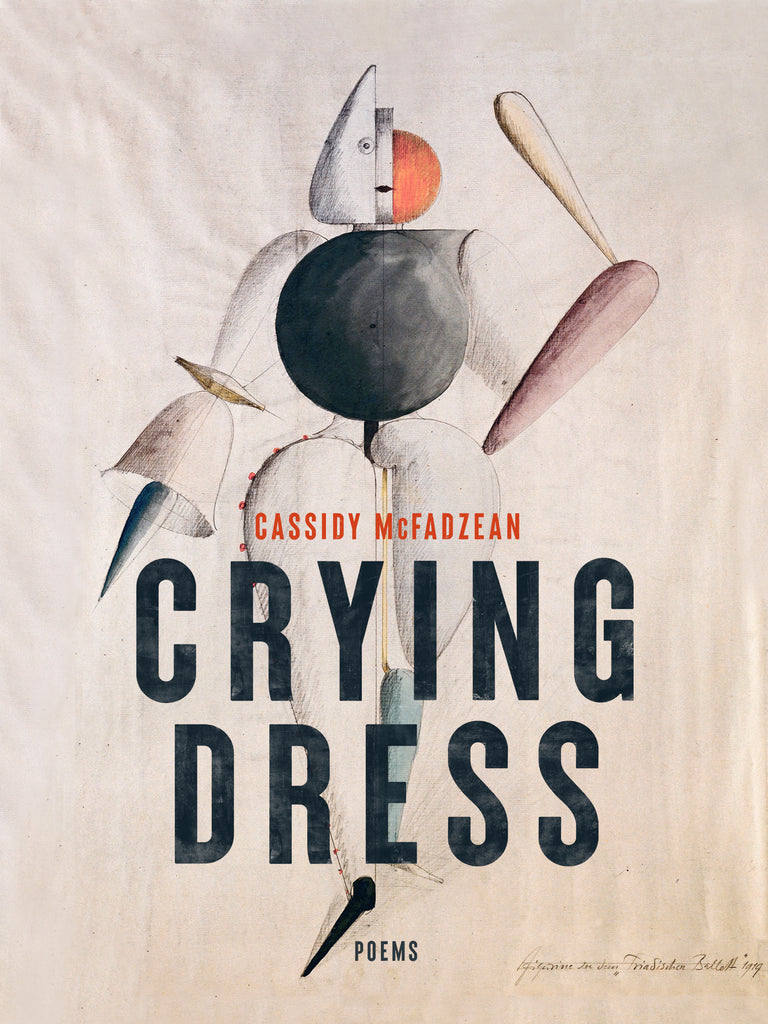The poems in Crying Dress, acclaimed poet Cassidy McFadzean’s third collection, explore the multiplicity of meaning that arises from fragmentation, rhythm, competing sounds, and ellipsis. Rooted in the tradition of lyric poetry, these strikingly original poems revel in musicality (rhyme, beat, and alliteration) while deploying puns, idiom, and other forms of linguistic play to create a dissonance that challenges the expected coherence of a poem. From the ghosts and gardens of Brooklyn and Sicily to the clanging of garbage chutes in Uno Prii’s modernist high rises in Toronto, to quiet moments of intimacy in domestic spaces, and the early days of sobriety and grief, Crying Dress explores the intersections between noise and coherence, the conversational and the associative, the architectural and the ecological, while reaffirming the poet’s sonic, vertiginous lyricism and gift for overlooked detail.
The poems in Crying Dress, acclaimed poet Cassidy McFadzean’s third collection, explore the multiplicity of meaning that arises from fragmentation, rhythm, competing sounds, and ellipsis. Rooted in the tradition of lyric poetry, these strikingly original poems revel in musicality (rhyme, beat, and alliteration) while deploying puns, idiom, and other forms of linguistic play to create a dissonance that challenges the expected coherence of a poem. From the ghosts and gardens of Brooklyn and Sicily to the clanging of garbage chutes in Uno Prii’s modernist high rises in Toronto, to quiet moments of intimacy in domestic spaces, and the early days of sobriety and grief, Crying Dress explores the intersections between noise and coherence, the conversational and the associative, the architectural and the ecological, while reaffirming the poet’s sonic, vertiginous lyricism and gift for overlooked detail.
| Published By | House of Anansi Press Inc — Apr 2, 2024 |
| Specifications | 112 pages | 6 in x 8 in |
|
Supporting Resources
(select item to download) |
Excerpt |
| Written By |
CASSIDY McFADZEAN studied poetry at the Iowa Writers’ Workshop, and fiction at Brooklyn College. She is the author of two books of poetry: Drolleries (McClelland & Stewart 2019), shortlisted for the Raymond Souster Award, and Hacker Packer (M&S 2015), which won two Saskatchewan Book Awards and was a finalist for the Gerald Lampert Memorial Award. Her crown of sonnets, Third State of Being, was published by Gaspereau Press in 2022. She lives in Toronto. |
| Written By |
|
CASSIDY McFADZEAN studied poetry at the Iowa Writers’ Workshop, and fiction at Brooklyn College. She is the author of two books of poetry: Drolleries (McClelland & Stewart 2019), shortlisted for the Raymond Souster Award, and Hacker Packer (M&S 2015), which won two Saskatchewan Book Awards and was a finalist for the Gerald Lampert Memorial Award. Her crown of sonnets, Third State of Being, was published by Gaspereau Press in 2022. She lives in Toronto. |
‘There was a time we could have gone back but that time has passed,’ writes Cassidy McFadzean in Crying Dress, where poems of grief and intimacy memorably explore modernity’s juxtapositions of the beautiful, the bizarre, and the brutal. Here ‘the bud of a tadpole in cupped palms,’ a Frida Kahlo pillow, and the last text message from a loved one become unexpected keystones in the architecture of the speaker’s experience. These surprising, moving poems relate newfound sobriety, nascent love, and irrevocable loss, while capturing the flickering quality of contemporary attention. McFadzean confronts the immense entropy of our moment and uncovers, within it, within us, tenderness.
” —Michael Prior, author of Burning ProvinceSeasonal affect falls into beautifully monstrous order in Cassidy McFadzean’s Crying Dress, a collection tracking a year’s circuitous passage in New York, Toronto, and abroad. Writing from the disorienting clarity of grief and new love, McFadzean sutures these states into blunt longing—to savour every warp of the world and to hover outside its adjunct horrors, a lyric zone in which the poet can ‘sing like an animal clawing inside.’
” —Daniel Poppick, author of Fear of Description
